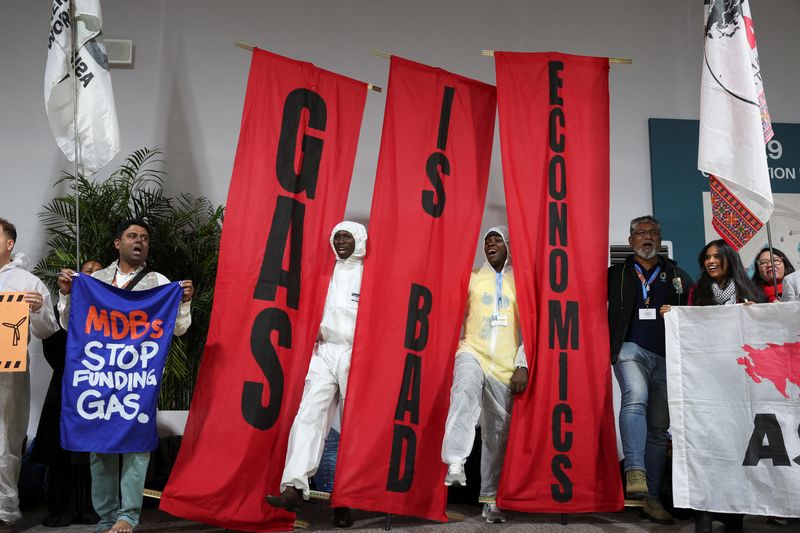Analysis-COP talks struggle in a year of climate stress and global bickering

By Valerie Volcovici and William James
BAKU (Reuters) – This year’s U.N. climate summit is struggling to focus minds on the health of the planet, with turbulent geopolitics, a confrontational host and the reelection of U.S. climate skeptic Donald Trump stealing the limelight.
The annual conference that aims to produce global agreements to limit the warming which is tipping the world towards climate catastrophe is becoming a forum of frustration for negotiators seeking a finance deal in the Caspian Sea city of Baku.
“The UN climate and environmental negotiations are increasingly becoming a tragic spectacle,” said Juan Carlos Monterrey, Special Representative for Climate of the Ministry of Environment of Panama.
Oil producer Azerbaijan, the host of this year’s 29th Conference of the Parties, is tasked with the limited goal of rallying countries around a target for annual financial aid for developing nations facing the rising costs of climate change.
It is a mandate that pales in comparison with the agenda for next year’s confab in Brazil’s Amazon rainforest, where governments will chart a course for the next decade.
But it is considered all-important for many countries ahead of Brazil’s COP30 and achieving it requires diplomatic skill.
Azerbaijan President Ilham Aliyev berated the United States and the European Union as climate hypocrites at the summit’s opening, souring the mood for countries central to the finance goal.
He later branded France guilty of colonial “crimes”, after which France’s climate minister canceled her trip to the venue.
On Friday, midway through the two-week summit, a group of former leaders, climate experts and scientists published an open letter calling for the COP process to be reformed, saying it “cannot deliver the change at exponential speed and scale, which is essential to ensure a safe climate landing for humanity.”
The COP29 presidency’s lead negotiator acknowledged that the multilateral process was under pressure in Baku.
“We consider COP29 as a litmus test for the global climate architecture,” Azerbaijan’s Yalchin Rafiyev told reporters.
The summit began on Monday with a dispute about the agenda, but the host nation did manage to get a deal done to endorse a global carbon market framework.
INCHING FORWARD
Former U.S. Vice President Al Gore implored delegates not to be discouraged in a speech on Friday to the summit, invoking U.S. civil rights leader Martin Luther King Jr.:
“He said ‘keep going. If you can’t fly, run. If you can’t run, walk. If you can’t walk, crawl – but keep going forward.'”
One developed country diplomat said the summit talks on finance were progressing, and noted the COP29 presidency was not being run by Aliyev’s office.
But many of the engines that drove past pacts have stuttered this year. There has been no bilateral U.S.-China deal, like those that boosted past COP ambitions.
The European Union, another bullish voice on climate in the past, was also on the back foot in Baku following a surge in support back home for right-wing political parties.
Many of the biggest players in climate talks didn’t even send their leaders this year, including the United States, China, India and others.
In all, about 50,000 people registered for COP29 – far fewer than the record 80,000 who thronged last year’s splashy, expo-like COP28 held in Dubai.
While many business executives skipped this year, the fossil fuel industry showed up, with the heads of Exxon, BP, Total, and Saudi Aramco. The activist coalition Kick Big Polluters Out said Friday it counted at least 1,773 fossil fuel lobbyists present.
Monterrey said people in Panama were dying from burning forests and rising seas while COP delegates wasted millions of dollars debating footnotes and attending cocktail receptions.
“For some nations, fossil fuel production may be a blessing, but for us, it’s a curse and a death sentence,” he said.
TRUMP EFFECT
Former U.S. president Trump’s re-election led some countries to lower their expectations before the COP had convened.
“This COP was hamstrung from the beginning,” said Jon Creyts, president of RMI, an energy transition think tank.
Trump has promised to withdraw the U.S. from international climate cooperation, as he did during his 2017-21 term, and has called global warming a hoax.
Ahead of the Baku summit, EU Climate Chief Wopke Hoekstra said the EU would “do our utmost to make the COP into a success, even if it’s only going to be a success of sorts”.
AOSIS negotiator Michai Robertson said it would be harder for negotiations to bounce back if Trump quits the Paris Agreement again.
“We’re in a different geopolitical context than we were the first time that they left. A lot of other countries are leaning right. There’s … less sort of camaraderie amongst the international community to get things done,” Robertson said.
In another blow, Argentina, whose President Javier Milei has also called global warming a hoax and was set to meet Trump this week, recalled its delegation on Thursday in order to “revaluate the situation.”
Even on the main stage, frustration was palpable.
Albania’s Prime Minister Edi Rama on Wednesday likened the summit to a TV without sound.
“Life goes on with its old habits,” he told the conference. “And our speeches, filled with good words about fighting climate change, change nothing.”
(Reporting by Valerie Volcovici and Will James; Additional reporting by Kate Abnett; Writing by Richard Valdmanis; Editing by Katy Daigle and Philippa Fletcher)